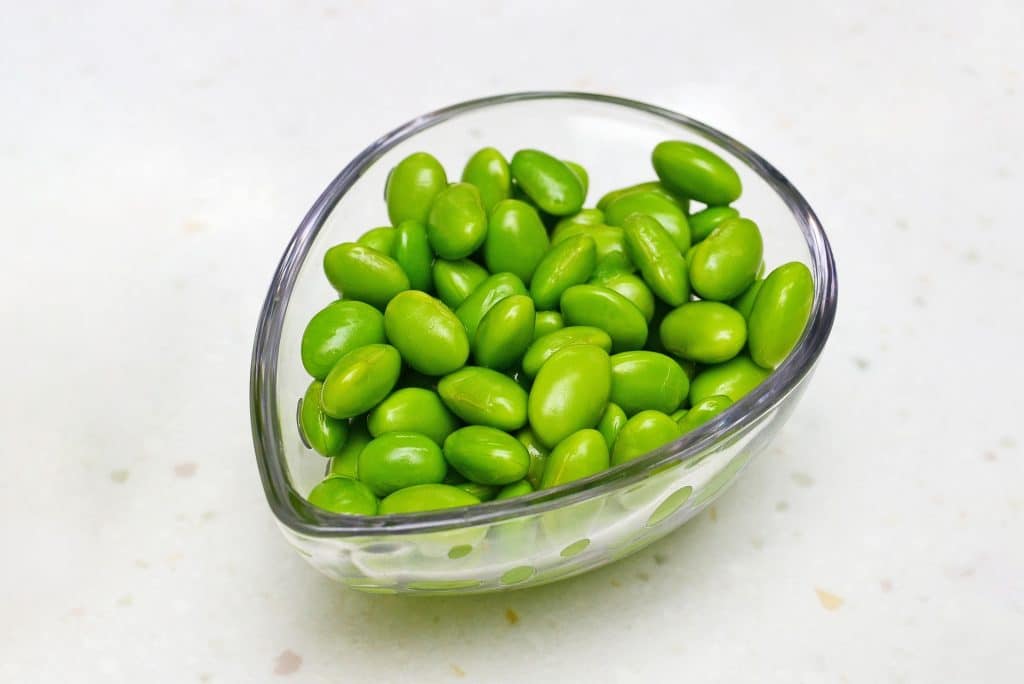Can Dogs Eat Edamame? A Vet’s Opinion

Edamame is an excellent option for dogs, but can you feed Edamame to your dog?
In the limit, dogs can consume Edamame. Edamame is high in plant-based protein and fiber, as well as vitamins and nutrients that are helpful to dogs. However, preparing Edamame correctly before giving it to your dog is critical.
Benefits Of Edamame For Dogs
Edamame can provide several possible health advantages for dogs when given in moderation as part of a balanced diet. Here are some of the benefits of giving Edamame to dogs:
Edamame is a plant-based protein source that can aid in developing and maintaining muscle mass in dogs. Protein is required for cell and tissue development and healing and can also help your dog’s immune system.
Edamame is high in fiber, which can help control digestion and encourage good bowel motions in dogs. Fiber can also make dogs feel filled and content, which can help them lose weight.
Edamame is high in vitamins and minerals, including vitamin K, folate, and iron. Vitamin K aids blood coagulation, folate promotes cell growth and development, and iron is required to create red blood cells.
Edamame is a low-calorie meal that can be a healthy treat for dogs. This is especially useful for overweight or obese dogs who need to reduce or keep a healthy weight.
Edamame contains antioxidants such as vitamin C and beta-carotene, which can help decrease inflammation and safeguard cells from free radical harm.
Can help lower cholesterol levels: Edamame includes isoflavones, which may help lower dog cholesterol levels. This is especially useful for dogs with cardiac illness or elevated cholesterol levels.
Edamame includes omega-3 fatty acids, which have been shown to promote brain function and may aid in improving cognitive function in dogs.
Edamame is a chewy treat that can aid in cleaning your dog’s teeth and promoting healthy gums. This can help to lower the chance of oral problems like gum disease and tooth decay.
Adds diversity to your dog’s diet: Adding Edamame to your dog’s diet can add variety and make meals entertaining for your dog. This helps avoid tedium and promotes good eating practices.
While Edamame may have some health advantages for dogs, it should be given in amounts and correctly cooked to prevent digestive problems. It is critical to confer with your veterinarian before offering any new foods to your pet.

How To Safely Give Edamame To Dogs?
Sure, here’s a more thorough answer on how to give Edamame to dogs safely:
- Cook the Edamame: Raw or undercooked Edamame can be challenging to process in dogs and can cause stomach distress. Bring a saucepan of water to a simmer, add the Edamame, and heat for about 5 minutes or until tender. Drain and chill before giving them to your dog.
- Remove the pods: Edamame shells can be tricky and fibrous, making them difficult for dogs to process and posing a choking danger. Before giving your dog edamame, make careful to remove the pods. This is accomplished by carefully squeezing the edamame stalks until the seeds emerge.
- Cut the Edamame into small bite-sized pieces: To avoid your dog choking or eating it whole cut it into small, bite-sized pieces. This will also aid digestion and make eating simpler for your dog.
- While Edamame can be a nutritious treat for dogs, it should be consumed proportionally as part of a balanced diet. Too much Edamame can cause stomach distress and other health problems. A decent rule of thumb is giving your pup Edamame as a treat rather than a substitute for their regular meals.
- Seasonings such as salt, garlic, and onion powder can be detrimental to dogs. Make careful not to season the Edamame and to serve it plain. If you want to add flavor to your dog’s diet, mix in a tiny quantity of Edamame.
- Speak with your veterinarian: Before adding new foods to your dog’s diet, always check with your veterinarian, particularly if your dog has any health problems or dietary limitations. Your veterinarian can advise you on whether Edamame is a safe option for your dog and how much to give them based on their age, weight, and general health.
Following these recommendations, you can easily give Edamame to your pup as a healthy and nutritious treat. However, it is essential to note that Edamame should not be used in place of a well-balanced diet.
Will Edamame Make A Dog Sick?
Edamame is usually safe for dogs to consume in moderation if correctly prepared and given in small quantities. However, Edamame can make dogs ill if it is not correctly cooked, prepped, or given in large amounts.
Raw or undercooked Edamame can be difficult for dogs to process, resulting in stomach distress such as puking, diarrhea, or bloating. Furthermore, edamame shells can be tricky and fibrous, making them difficult to process and a choking danger for dogs. To prevent these problems, thoroughly cook the Edamame and separate the pods before giving it to your dog. Cut the Edamame into tiny, bite-sized chunks to avoid choking and make it simpler for your dog to process. Giving your dog Edamame in balance is essential, as too much can cause digestive distress or other health problems. A decent rule of thumb is giving your pup Edamame as a treat rather than a substitute for their regular meals.
Always contact your veterinarian before adding new foods to your dog’s diet, particularly if your dog has any health problems or dietary limitations. Your veterinarian can advise whether Edamame is a safe option for your dog and how much you should give them based on their specific requirements.

Vet’s Summary
Edamame is a low-calorie, nutritious treat with various health advantages for dogs. It’s high in protein, fiber, vitamins, and minerals like iron, folate, and vitamin K. These minerals help dogs maintain strong muscles, bones, and immune systems. Furthermore, Edamame includes antioxidants, which can help safeguard cells from free radical damage. This may help lower the chance of chronic illnesses like cancer and heart disease in dogs. Edamame is also a healthy substitute for high-calorie snacks for dogs who are overweight or prone to gaining weight. It can fulfill a dog’s chewing needs while providing a delicious snack without adding additional calories to its diet.
Giving probiotics to dogs has numerous advantages. They can help to improve digestive function by assisting in food digestion and nutrient uptake, which can help to avoid issues like diarrhea and constipation. They may also decrease intestinal inflammation and boost immune function, which can aid in the prevention of illnesses and other health issues. Natural sources of probiotics include yogurt, kefir, and cultured veggies. However, determining how much of these items to feed your dog to provide an efficient dose of probiotics can be challenging. As a result, many pet owners give their dogs probiotic vitamins, which are available in powders, pills, and chews.
Videos To Watch
Here’s a short video that will help you understand if dogs can eat Edamame or not:
Can dogs have edamame beans or not? Here is a video that will help you understand:






